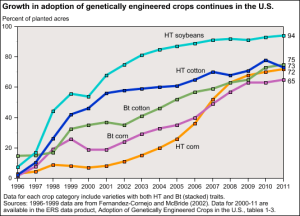Updated January 2, 2018
LONDON — The controversy over genetically modified crops has long focused on largely unsubstantiated fears that they are unsafe to eat.
But an extensive examination by The New York Times indicates that the debate has missed a more basic problem — genetic modification in the United States and Canada has not accelerated increases in crop yields or led to an overall reduction in the use of chemical pesticides…
An analysis by The Times using United Nations data showed that the United States and Canada have gained no discernible advantage in yields — food per acre — when measured against Western Europe, a region with comparably modernized agricultural producers like

France and Germany. Also, a recent National Academy of Sciences reportfound that “there was little evidence” that the introduction of genetically modified crops in the United States had led to yield gains beyond those seen in conventional crops…
By contrast, in France, use of insecticides and fungicides has fallen by a far greater percentage — 65 percent — and herbicide use has decreased as well, by 36 percent.
Twenty years ago, Europe largely rejected genetic modification at the same time the United States and Canada were embracing it. Comparing results on the two continents, using independent data as well as academic and industry research, shows how the technology has fallen short of the promise.
Also See: GENETICALLY MODIFIED ORGANISM GMO SAFETY
Read More Here: Via The New York Times

